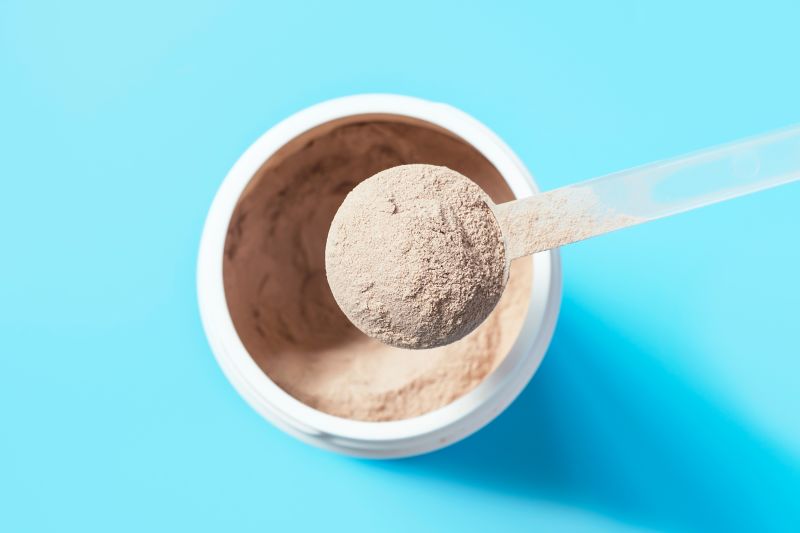
Over-the-counter protein powders may contain disturbing levels of lead and cadmium, with the highest amounts found in plant-based, organic and chocolate-flavored products, according to a new investigation.
There is no level of lead that is safe for humans, according to the US Environmental Protection Agency. Cadmium is a carcinogen which is also toxic to the body’s heart, kidneys, gut, brain, respiratory and reproductive systems, according to the US Department of Labor’s Occupational Safety and Health Administration.
“On average, organic protein powders had three times more lead and twice the amount of cadmium compared to non-organic products,” said Jaclyn Bowen, executive director of the Clean Label Project, a nonprofit dedicated to transparent food labeling that released the new report Thursday.
Plant-based powders, such as those made from soy, rice, peas and other plants, contained three times more lead than whey-based products, according to the report. (Whey is the liquid byproduct of cheesemaking.)
Plants naturally absorb heavy metals from the planet’s crust but can contain elevated levels if grown in soil that has been further contaminated by mining, industrial waste, and some pesticides and fertilizers.
Another key source of contamination in protein powders was chocolate flavoring, according to the report.
“Chocolate-flavored protein powders contained four times more lead and up to 110 times more cadmium than vanilla-flavored powders,” Bowen said.
Despite being rich in flavonoids, antioxidants and other beneficial minerals, dark chocolate, or cacao, has been found to contain high levels of heavy metals. A July 2024 study found 43% of six dozen dark chocolate products exceeded California’s Proposition 65’s maximum allowable dose level for lead of 0.5 parts per million.
“Heavy metal contaminant is a global food safety problem,” Bowen said. “These contaminants are basically everywhere, including in things that are being represented as health foods.”
“Without such clarity, consumers and industry stakeholders cannot fully evaluate the validity of the claims,” said Andrea Wong, CRN’s senior vice president of scientific and regulatory affairs.
“Modern analytical techniques can detect even trace levels of naturally occurring elements, such as heavy metals, which are present in soil, air, and water,” Wong said. “These trace levels are often well below established safety thresholds set by federal agencies like the Food and Drug Administration (FDA) and the Environmental Protection Agency (EPA).”
Good news on BPA
For the new investigation, the Clean Label Project purchased 160 products from 70 of the best-selling brands of protein powders. The brands were not disclosed in the report, however.
“We do not disclose the names of companies we test in order to maintain fairness and consistency and to avoid potential conflicts of interest,” Bowen said.
Protein powder samples were then sent to an independent certified laboratory, which ran nearly 36,000 individual tests on 258 different contaminants, including heavy metals, bisphenols, phthalates and perfluoroalkyl and polyfluoroalkyl substances, or PFAS.
However, only levels of lead, cadmium, bisphenol A and its cousin bisphenol S, more commonly known as BPA and BPS, were included in the 2024 report. Data on other contaminants will be released in a later update, Bowen said.
Bisphenols are hormone disruptors that studies have linked to fetal abnormalities, low birth weight, and brain and behavior disorders in infants and children. In adults, the chemicals are associated with the development of type 2 diabetes, heart disease, erectile dysfunction, cancer and a 49% higher risk of early death within 10 years.
Bisphenol A was widely used to create baby bottles, sippy cups and infant formula containers until frightened parents boycotted those products more than a decade ago.
A similar investigation of protein powders by Clean Label in 2018 found high levels of bisphenols. The 2024 report, however, had good news, Bowen said.
“We found BPA and BPS in only three of 160 protein powders, compared to 55% of the products we tested in 2018,” she said.
To analyze heavy metals, researchers at the Clean Label Project compared lead and cadmium testing results with levels established by California’s Proposition 65.
“Prop 65 is arguably the most progressive law in the land when it comes to industrial environmental contaminants,” Bowen said. “They have very clear pass-fail criteria that is typically much stricter than federal agencies in the US.”
Overall, 47% of the 160 protein powder samples tested by the Clean Label Project in 2024 exceeded Prop 65 regulatory guidelines, the report said. About 21% of the powders contained levels twice as high as the Prop 65 limit, Bowen said.
Nearly 80% of the plant-based and organic protein powders tested were over the Prop 65 limit for lead. However, only 26% of collagen-based protein products and 28% of the whey-based products exceeded the California lead limit.
What consumers can do
It’s not necessary to stop using protein powders as part of a healthy lifestyle, Bowen said, but it does help to shop smart.
“For people following a fully plant-based diet, protein powders made from peas appear to have the lowest levels of heavy metals,” she said. “If you don’t have any dietary restrictions, the data suggests that whey-based or egg-based, vanilla-flavored protein powders will have the least amount.”
Reaching out to favorite brands to inquire about contaminant levels is another smart action by consumers, Bowen added.
“Ask questions, demand answers,” she said. “The topic of heavy metals isn’t going away.”
